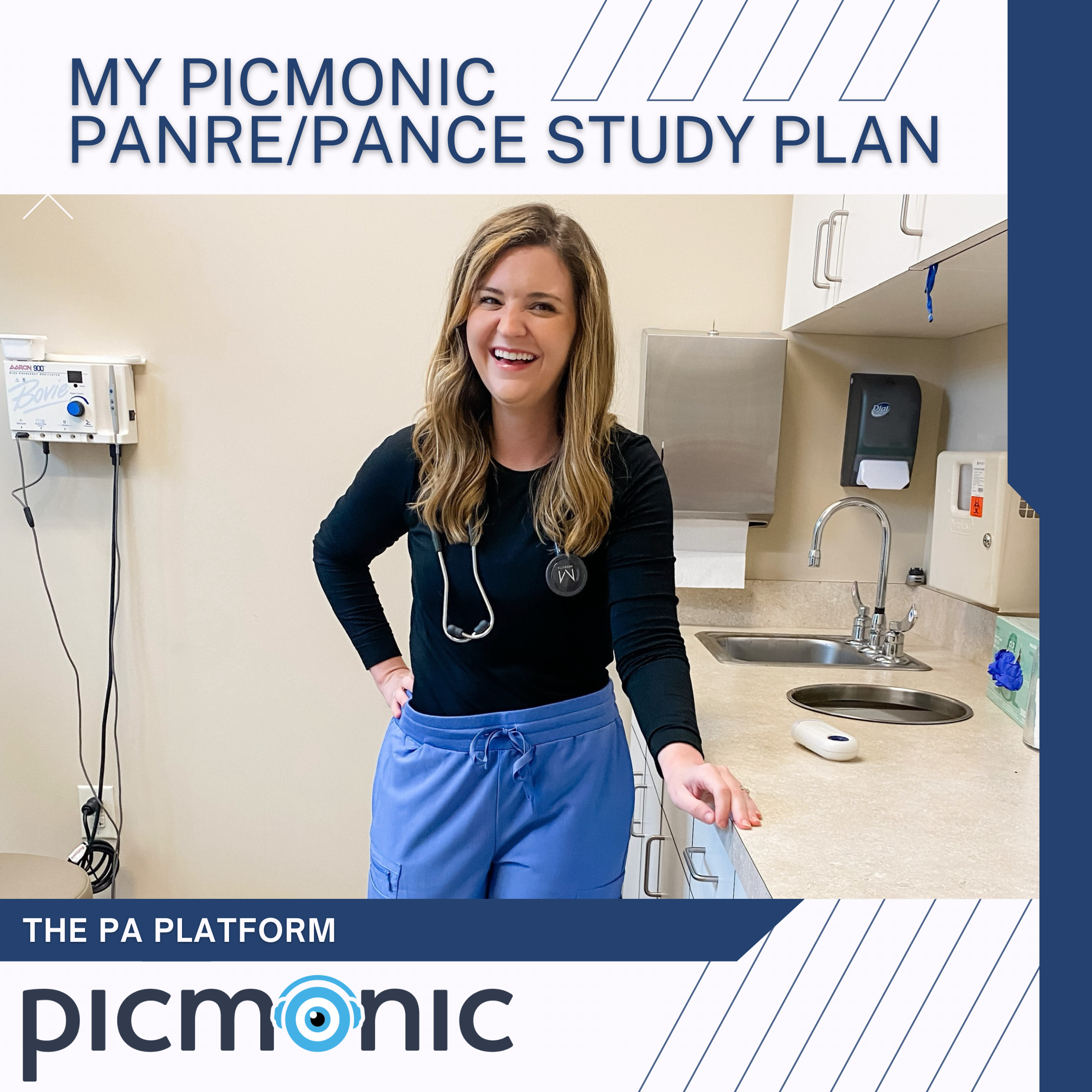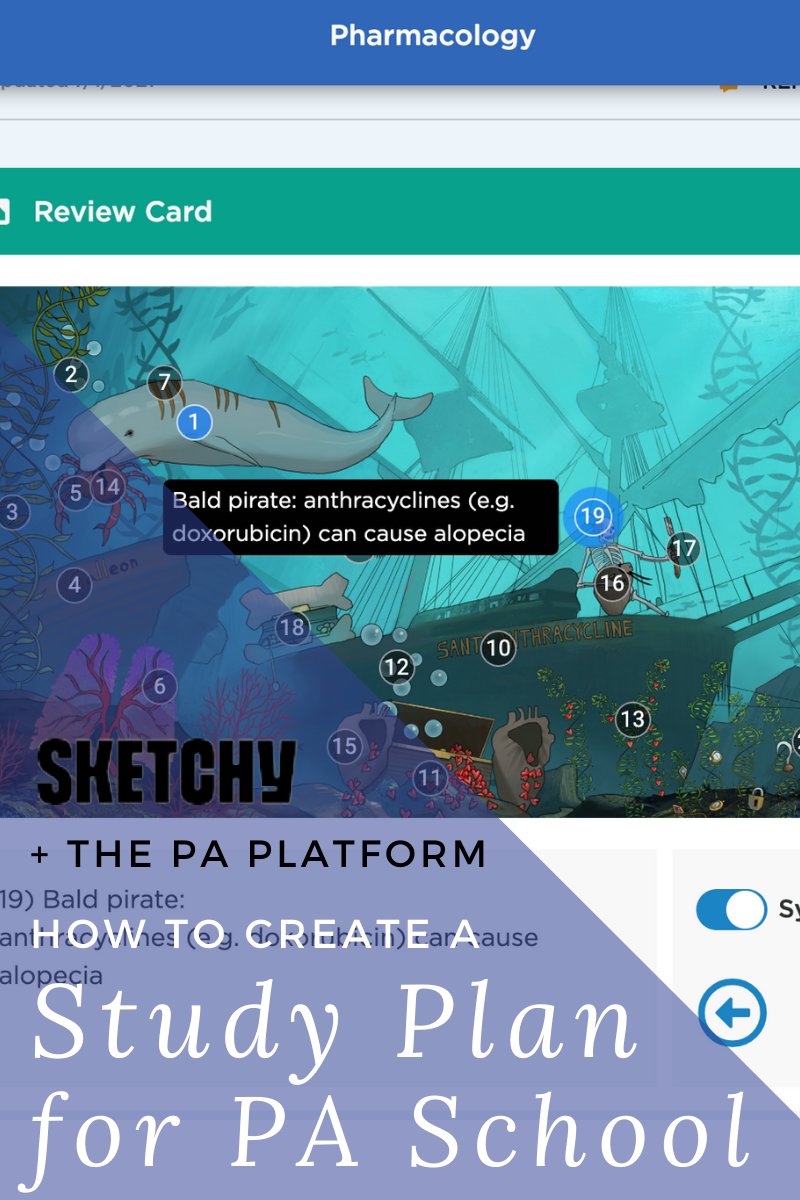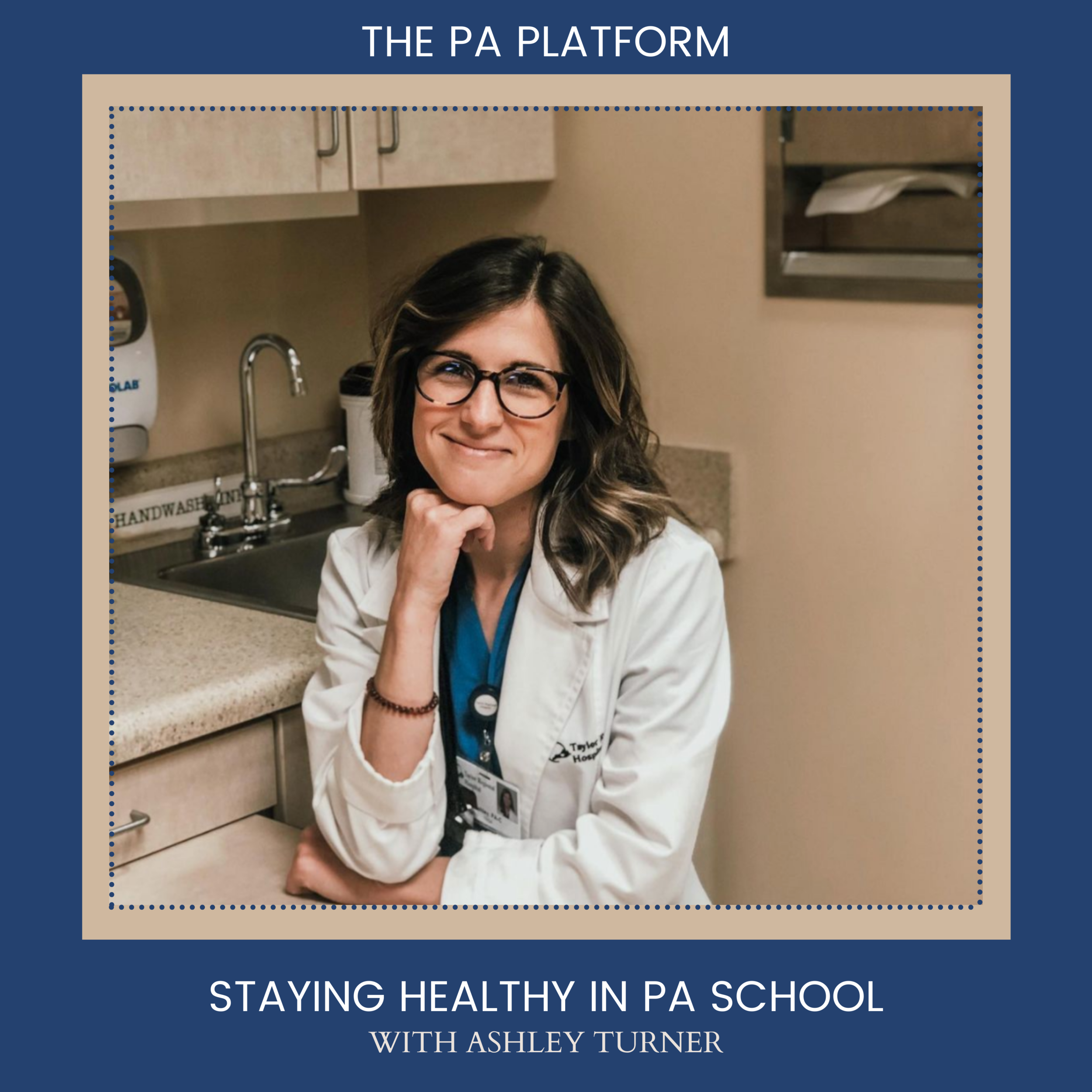I am really excited about this post because it is highly requested -- learning more about the financial part of paying for PA school. I brought on one of our interview coaches, Hanna, to share her experience with you because we have different experiences as far as the type of PA schools we went to, the cost associated and how we each paid for it. My hope is that this episode will help you plan for the future and understand the process of how people pay for these HUGE price tags that come with PA school.
Before we do a deep dive, I want to point out that this is a very extensive topic, there's a lot that goes into this. We are not experts, we are not financial advisors. We're not going to share logistics of how to apply for these things or what exactly a certain program covers. For that you need to go to your registrar's office program websites. A lot of times your school will have this information, they'll tell you how much a program cost, what's involved, the fees, tuition, etc… and how to apply for aide and whatnot. Just know that everyone’s situation is different and this is a very personalized topic.
Savanna (S): Hanna's going to start us off with talking about just what does it cost to go to PA school? What are the fees involved?
Hanna (H): In regards to cost a PA school and just as you just said, this is super expensive, there's a lot of different aspects to take into consideration. With the 223 programs, and varying private versus public programs in state versus out of the state that in general, right there is going to really bring down or hike up the cost of your program. I'm at the median cost going back to 2015/16 school year was about $89,000, for a private PA program. That, in comparison to where I went to school, it was a private program -- I was at $102,000 and that was six years ago. Clearly, that's kind of under marketing some of the programs out there. We also looked at the public median cost, and that was about 52,000. Stepping back, really look what schools are you applying to and doing your research on their website. Most schools have a wonderful cost breakdown of their tuition, the cost expected for fees and lab coats, didactic versus clinical years, and really getting a true idea of what the basis is going to be for your specific program.
S: Just to jump in, you're $102k was for your total tuition for the whole time your in PA school?
H: Correct.
S: That's what these numbers are referring to , i.e., $89,000 as a median cost is your entire tuition fee for the two/three years, you're in school. Because schools are different lengths, you're going to have different amounts you owe each semester. In comparison to Hanna's private program, I went to a public in state program as an in-state resident. My final tuition was around $45,000 for my 27 months program. That's a pretty big difference. But hey, we're both PA.
H: That's another great point that you mentioned in regards to length of program, my program was a 26 month program. Definitely something else to consider is how long are you going to be in the program, because that will definitely change the cost.
S: Yeah, and I think also, just for people who are maybe in the process right now of deciding what school to go to, I think cost should be a factor -- I don't think it should be the only factor because you should choose somewhere where you're going to be happy. Also think about when you start school, especially going into application season -- if you're able to start a program in January compared to September, and then you're going to potentially graduate earlier, and especially if it's a shorter program, that can essentially give you eight extra months of income. It might make it more financial sense to go with the program that starts sooner if you're just looking at the cost of everything.
I thought this was interesting, the PAEA did a survey in 2015 of students starting PA school and one question was, “What do you expect your total debt from PA school to be, not including personal debt just from school?” 21.9% said they expected $100k to $125k, 20.8% said $75k to $100k, 14.5% said $50k to $75k. That's a pretty good spread and a lot of money. I know it sounds like a lot of money and something to mention, coming out of school right now, the average salary for a new grad PA is around $75k to $80k. There are a lot of factors that go into that, such as where you live, cost of living and specialty and all that. This is just an average.
Let's talk in-state versus out-of-state program costs. I decided to go in-state and the cost was part of it. That price tag looked a lot better than another program I was considering that was four times as expensive when it came to tuition and cost of living and all that.
H: I knew that I wanted to go out of state and there was a big push for me to stay in. I grew up in Georgia from Atlanta. I've always wanted to go out of state and I made that decision applying to graduate school programs, specifically out of state. One of my biggest regrets was not taking into account the finance, the process, and not really having a full grasp of how the various costs of the PA schools. And I didn't realize that much further into my application process. Ultimately I didn't end up taking that into consideration with my school choice. And I'm paying that off now.
S: I think a lot of people are at this point are so eager to get in that they don’t look at that and it’s ok! Like I mentioned earlier, I don’t think it should be the biggest deciding factor, but it should play a role. One question we got on The Pre-PA Club Facebook group is, “Can you switch from out-of-state to in-state, so if you apply to a school that has a cheaper option for in-state residents, can you technically become a resident?” You know, for Georgia, I think there were a few people who were able to do this, I think you have to live in Georgia for over a year and have a good amount of documentation in your name, you have a license and bills, to show that you're truly a Georgia resident. Now, if you're only gonna be there another year, is it worth it? I mean, you're probably saving $10-15,000 but then you're gonna have to move and do all that again, most likely. Each state's going to have their own rules. Hanna, your school didn't have an in state option?
H: Correct. A lot of the states are very happy to have lived in that state for one year client, Most states and again, a very, that you have to live there for one year prior to starting your program. With that being said, most of us are finding out that we're getting into a program until under that one year mark, and it's very specific in regards to one year, so not, a school year but rather one full year. In many schools, once you've come in as an out of state resident, you cannot switch to an end state further along in the years. Schools have become very strict on following this, looking at where you're paying your taxes with, where you're registered to vote. It's not so much “Oh, my grandmother, or my sister who lived in New York”, which is where I went to school. It is definitely something that you really have to take the time to look at what your state requirements are and to talking to the school because some of them are willing to help make it work, especially it's, you know, come close to qualify.
S: Yeah, and I think that, again, is something to look at. Just from an application standpoint, if you're applying to schools, because that process is expensive, too. That's a whole other post. If you are applying to schools, I strongly discourage applying to in-state programs, if you are not a resident of that state or if you don't have an extremely competitive application, and you know, some of these schools, they set 90% in state residents. At my school, we had 44 people, and it was 90% in state residents, we had, I think four or five people who are out of state. That wasn't something that was negotiable, they had a certain number of spots, because they got public funding. You could apply there if you're out-of-state, but your chances compared to an in state resident were so, so much less. You don't really want to waste your time and money applying to a bunch of programs that you are really only competing for a few spots.
H: One thing that I found really interesting that I didn't know existed when I applied to PA school. and now that I'm living on the West Coast I have been interested in because I've been helping do mock interviews, and watching these acceptances start to roll in, which is very exciting, is that a lot of states participate in regional programs. Although you may be from California, I know that there's a Western Regional graduate program that allows Western applicants to apply to other schools within the region and your aren’t stuck to just your home state and still get in-state tuition. There's a regional one for the southern region, Western, New England that I was able to find. These do apply for graduate school. I would definitely recommend looking into these and seeing if you qualify for those qualifications.
S: My school kind of did that because we're right on the border of Georgia and South Carolina, I went to Augusta University -- if you were from a few certain counties in South Carolina, you were considered an in-state resident for tuition purposes which was awesome for them.
This was something that I thought was worth talking about, switching to in-state, if that's an option for you, you're going to try to become an in-resident, if you are still being filed on your parents taxes, you may not be able to switch. My parents claimed me on their taxes until I got married and I was 23. They were helping out with my school. As a parent helping out with my school, they got a little bit of tax benefit from that. They wanted me on their taxes to be able to write that off and get that reimbursement or whatever they got, I don't really understand taxes. They would not have probably let me switch or wanting me to unless I wanted to start buying my own taxes and paying for the rest of my school, which I did not.
H: Definitely communication is key with that one with your parents. I know my parents and I went back and forth on that for a little bit because they can save I think it's up to like $2,500 per tax season so that can definitely add up pretty quickly. You also don't want to get caught doing tax fraud by both trying to file for that. Definitely having good communication is key.
S: Definitely. Okay, so how do people pay for PA school?
H: The number one thing you need to do is you need to apply for FAFSA. For FAFSA, that's your federal aid for for students across the board. It's that kind of the best way to start and it's broken down into direct subsidized loans and unsubsidized They have a great website called FAFSA forecaster that predicts your expected contribution of your fees to graduate school. In graduate school, you don't actually qualify for direct subsidized loans, that's no longer available, they cut it out in 2012. Basically, in a lot of applicants, probably do have loans from undergraduate but during undergrad when you got these loans, all that meant was the government was helping pay for the interest on these loans, so that was not accruing. This is a really big deal and would be really nice to have for graduate school but now for graduate school, you can only apply for direct unsubsidized loans, also known as Stafford loans. What that means is that you can take up to $20,000- $20,500 for a year, I believe. As soon as you take out that money, you start to accrue interest on that money and you're responsible for paying that once you get out of that program. You get a six month leeway with that, but the interest is accruing the moment that you receive that loan.
With that, let's talk a little bit in terms of what that money does. When you go through the FAFSA application, which I don’t know about you, Savanna, but I felt like it, it's very straightforward. Name, DOB, -- very straightforward application. Once you get approved, which is relatively easy, that money goes directly to your program. You don't ever touch the money that goes directly into your program. It gets immediately applied to tuition and fees. If there's money left over from that, it falls into your room and board if you are rooming with the school, then after that they reach out to you for permission to put it towards other charges that may come with the program. If there's still money left over from that point, then you get a check, or somehow receive that money back and use that towards your education costs. Savanna, I’ll let you take it over for a little talk about your experience with FAFSA and a scholarship.
S: I applied for FAFSA, I didn't have any debt from undergrad, which was great. Georgia has something called the HOPE Scholarship where if you qualified, and it’s changed a little bit since I got it, but they essentially cover all of your tuition and fees. The only thing that I had to pay for, or my parents helped me pay for, in undergrad was living expenses, which was amazing. I had to obviously keep my grades up and all kinds of other qualifications but going into grad school, I did have to take out loans. I took out these Stafford loans, I filled out FAFSA. I was actually the last or at the tail end of when you got subsidized loans. I had one semester where I got a little portion that was subsidized, which I'm thankful for but the rest of my loans were unsubsidized. I took out the $20,500 for the year. Now my tuition for the year was a little bit and fees was a little bit more than this. I ended up taking out total $45,000 in I guess I took $40,100 but my tuition was $45,000. My parents did help out with you few thousand here and there, which I appreciate and I was living with them which helped save on expenses. These loans did end up getting interest right away. Now, you put the current rate here, which is 6.6% -- that is a very high interest rate. Just FYI, I think mine was around that, too. My supervisor physician talks about her loans from medical school and her percentage was like 1% -- it's so so low, and it has changed so much since then.
I'll talk a little bit about my experience FAFSA, because when I applied, I was awarded a scholarship randomly, and I didn't know that I was applying for scholarships, but some of them do pull your information from FAFSA. About a semester into PA school, I got a check in the mail for $1,500 dollars and a little letter saying I was part of this Lettie Pate Whitehead Scholarship, and a few other people in my class also got it. I received those checks, I think three times during school, which was crazy -- it was just out of nowhere. It was one of those things where you get the check in the mail and you kind of question it, is this real? Is this a scam? What is it? When I looked it up, it was a real thing. It's a special scholarship for women in the Southeast who are pursuing medical degrees -- that was awesome. That helped out a ton with my fees and extra expenses here in there -- you've got to pay for equipment, all kinds of things. Luckily for me, I didn't have to take out any additional loans. Just to clear things up, the way that most people pay for PA School is loans and that's okay. I mean, I would say there are a few extremely lucky people who maybe their parents can help them out completely, or they were able to save a ton of money, but for the most part, everyone's going to have loans. Would you agree, Hanna?
H: Absolutely. I think one, you know, the bright light at the end of the tunnel is that we're going into a career where we should be making money to pay back those loans. That's incredibly rewarding and exciting, because a lot of people do not have, necessarily that guarantee when they get out of graduate school. I do think that it's you know, and most people have already made this decision that it is an investment that is worth making. You definitely have to make sure that you're ready for that because it is a lot of money. If you're not going to follow through on it, you don't even want that first $20,000 of debt sitting on you.
S: I mentioned that at the beginning, before we started that, I was just getting my loan money went straight to my tuition and fees. I never saw a penny of that. I did not check my interest before or throughout school -- I just didn't want to know, I didn't want to look. I knew it was accruing interest. By the time I graduated that $40,000ish had turned into $75,000 that I owed and that was a little shocking to me. That is what it is what it is.
H: It definitely stings and is motivation to get that job.
S: Oh, yeah, I went to work right away. I was like no vacations here, put me to work!
One question was, how do you know what to do? How do you know how to get these loans? How do you know how to pay for this stuff? Is this something that schools help with?
H: I would head to the financial aid office, they're definitely going to point you in the direction of FASFA first. They may also be aware of certain scholarships, it really depends on how involved the financial aid section of your schools involved in the graduate program, I felt where I went to school, it was not as involved as it was in the undergrad program, because they had a massive undergrad program. You're really able to find some better systems online, and they can definitely at least point you in the right direction. I think it's a great place to start. How about you? How did you go with that?
S: I felt like our school was very helpful. The first thing they tell you to do is fill out FAFSA. They kind of tell you that and then give you a little bit direction as far as loans after that. What would what would be the next step after you got your Stafford loans, they paid for your tuition fees, but now how are you going to pay for living expenses?
H: Absolutely. So definitely, with the cost of my program, the $20,500 did not cover my tuition and fees so that's when I started to look at grad PLUS loans. Those loans are at a higher interest rate, they are at a higher fee, I believe the interest rate is about 7.12% don't quote me on that, but it is still high, but it's not 12-13%, which you may see some private loans at, and this is going to change year to year. With the with the grad PLUS loans, they will cover for the rest of your fees for your program, minus of course, they take a look at what other loans you've already received and subtract that from what they will finally get to you. That can be used towards living expenses. For example, I was living in New York, paying for a studio apartment in Manhattan is not cheap. My sister shared the studio apartment for a little while because of expenses, and really just did whatever we could to get the costs down. But you know, those loans went towards that and for food and those coffees that I probably should have cut out a little bit more, but they just surviving PA school.
S: When people ask, how much should they took out loans. In my mind, you want to take out the most minimal amount possible. Everyone's going to be a little bit different in their kind of thoughts on this because I definitely had people in my class who ate out every single meal, and I knew that they were living on loans. Then after school, usually they were the first ones to go buy a brand new car. You have to make your own I think financial decisions but you want to make sure you have enough money to live on to.
H: I think you just kind of have to learn semester to semester, I know that some of my really close friends in PA school, we talked about this a lot. It was like how much are you taking out? Calculating our rent and our expenses? I think it should be an open conversation because it you know, it is the same cost to attend this program across the board. Are you kind of keeping in mind but like, are you paying $2,000 more per rent than your friend? Do you need a roommate? Should you save those expenses, but also just making sure, like the cost of your stethoscope and your books and other fees are kind of keeping in line and holding each other accountable for some sort of budget to figure out what you should be taking out and trying to live off.
S: I agree. Plus, you can always take out money and then give it back. You don't have to use it all or you don't have to let it sit there. If it's in your savings account that makes what like 0.05% interest rates, like those that nickel you make over six months is not going to counteract the interest that you paid on it. This is not money that you want to take out and try to invest. It's not fair investing, your return is not going to be higher than your interest rates. Again, I'm not a financial advisor, but I've read enough White Coat Investor to know that that is not a good idea.
I don't know what your thoughts are or if you have any experience, but do you know if people are paying back loans for undergrad, if they go into deferment? I feel like this is going to depend on where that came from?
H: Exactly. So This is definitely dependent on where the loan came from. We're talking about the terms of the subsidized loans earlier meaning government's paying your interest. If you are enrolled in school, at least half time, those direct loans will be placed into different banks. You don't have to make any payments on those until six months, just kind of like your other your first a new loans give you this grace period. If they're private loans, if you're not sure what type of loan they are, you kind of need to do the research. These things are changing constantly. In regards to something we didn't mention earlier, but there was a Federal Perkins loan for a while and that no longer exists. So laws come in and out based on the year. You really have to do your due diligence, following up on what's going to happen with your student loans.
S: I love Google who doesn't. I mean, just kind of searching for things, you can find stuff on the PA forums, and there's a lot of information out there. But again, your school is going to be the best person to talk to, and talk to the class above you and see what advice they have as far as what they've done and maybe mistakes they made just so you can try to avoid that.
H: We want to close off This episode in regards to talking about refinancing. After you've made it through PA school, and you've got multiple different types of loans, possibly public and private, really looking over those loans and more specifically, the interest that you've accrued on them and the interest rate at which they're accruing. So for myself, I think I had six or seven different loans come after the completion of PA school. The loans really varied year by year. I might have had one that was kind of had a 4%, 6%, 7%, I had a 12% and a 15%. Then I had another one that was relatively low, 4-5%. The first thing that I did was sat down and talked with my parents about them and again. This is an important aspect to remind you guys that we're not financial advisors, you really should consider speaking to someone about this, but knowing that you can refinance these loans and basically group them together as one specific, total sum of money and reduce the overall interest rate. That way, you're paying maybe 6% on all of your loans rather than possibly the high 12-15% loan. That's really going to change year to year. If you guys want to really follow this market, you've seen that this year, interest rates have gone up quite a bit, last year they were much lower. Watching to see what they do over the course of your PA school career. SOFI is one of the refinancing tools and there's Earnest and Common Bond, there are so many out there, but a lot of these specific businesses, they look at graduate students who are coming out of programs that they know are going to make a good salary.
The reason why that they aim their businesses towards us, because they know if you're making a good salary, you should be able to pay off your debt, that you shouldn't become bankrupt and go out on your loans. With that, they're really willing to work with you and set a low interest rate in comparison to what you've been sitting on for the past, let's say 26-27 months. So it's definitely something to look at multiple at these different options and companies to see what the lowest possible interest rate you can get. So that you can ultimately start paying off these loans and paying off as little interest as possible.
S: I only have federal loans so I was not able to refinance, I have looked into it. With some of the kind of repayment or federal programs, if you do end up refinancing your loans, they kind of lose eligibility for some of that. So you really have to look at it and think about it, talk to someone who knows what they're talking about, like a financial advisor before you decide to do that. I have heard really good things about the SOFI.
Anyway, another thing that people sometimes talk about is, and this is just a way to pay back your loans afterwards is, will jobs pay for your loans? Is there a way for your employer or your supervising position to pay back your loans or help you out with those? It's not out of the question, I've heard of that happening. In my mind, you never know until you ask and so when you're in your contract negotiations, why not throw it out there you know, see if there's options for some loan repayment. Usually the way I've heard it work use you know, through there for a year you get a certain amount or two years or three years that go straight towards your loans, or it's given as a bonus for your loans, essentially. That's something to think about. It doesn't happen that often, I don't think so. Didn't happen for me, you never know.
Thank you so much, Hanna for taking the time to share your experience!
Make sure to check out my Youtube channel to learn about more ways to pay for PA school! Here are some videos you may be interested in: Student Loan Options for PA School, How to Afford to Pay for PA School, Learn How to pay for PA School with Stride Funding, and How to pay for PA School.
To listen to this interview as a podcast, click here!
Let us know other topics you would like for The PA Platform to cover in the comments below.

















